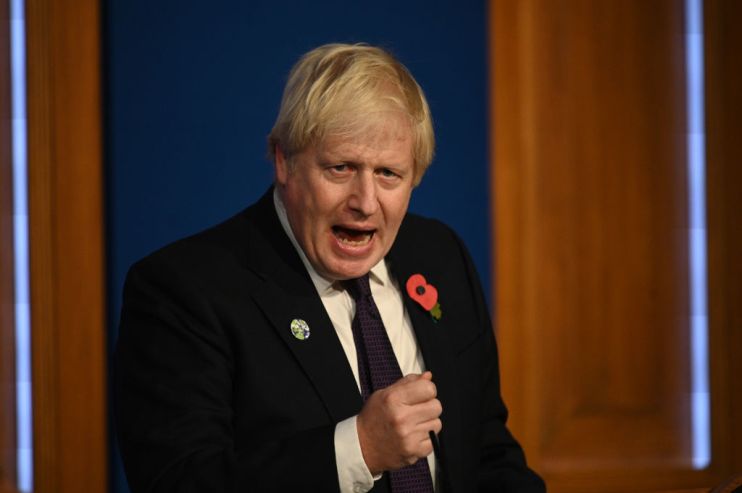Cop26: Boris Johnson seeks to downplay failure to get deal to end coal power

Boris Johnson has sought to play down the failure at Cop26 to get an agreement to end the use of coal power, saying a push from India and China to water down the final deal won’t “make much difference”.
Johnson today claimed the deal agreed by 197 nations at the United Nations summit in Glasgow was “historic” and “game changing”, despite the last minute changes.
Cop26 president Alok Sharma fought back tears on Saturday as it was announced China and India had dictated a change of words in the Cop26 deal, which saw countries agree to “phase down” coal instead of phasing it out.
An agreement to ban fossil fuel subsidies by national governments was also watered down.
Sharma told Sky News yesterday that the two countries will “have to justify” their stance on coal to countries most at risk of climate-related catastrophe.
However, Johnson struck a much more upbeat note in a press conference and said he rated the success of the summit at least a 7 out of 10.
“It’s an immense thing to get a commitment from 190 countries to phase down or phase out coal,” Johnson said.
“Whether the language is ‘phase down’ or ‘phase out’ doesn’t seem to me as a speaker of English to make that much difference – the direction of travel is pretty much the same. That’s never been said before.”
He also said that India’s late moves will not make a difference to negotiations over a post-Brexit trade deal with the Commonwealth country.
“I don’t think there’s any need in particular to introduce this into our bilateral relations,” he said.
Labour shadow business secretary Ed Miliband said the press conference was a “was a classic Boris Johnson performance – overspinning and under-delivering”.
“This summit made modest progress but the Prime Minister over-selling what it achieved serves nobody,” he said.
“The truth is that we are miles off where we need to be to halve emissions this decade and deliver justice for developing countries.”
Sharma last night said “to all delegates I apologise for the way this process has unfolded and I am deeply sorry”.
Speaking to Sky News today, Sharma said: “Of course I would have liked to maintain the ‘phase out’ rather than changing the wording to ‘phasing down’. But you know on the way to phasing out you have to phase down, but ultimately of course what we need to ensure is that we continue to work on this deal and on these commitments.
“On the issue of coal, China and India are going to have to justify to some of the most climate vulnerable countries what happened. You heard that disappointment on the floor.”
The Glasgow Climate Pact is the first Cop deal to include a clear commitment to reduce the use of coal, which is the worst fossil fuel for carbon emissions.
However, representatives from island nations that are vulnerable from climate change-related sea level rises said this wasn’t enough to save them from disaster.
Aminath Shauna, Maldives environment minister, said “it will be too late for the Maldives”.
ndian climate minister Bhupender Yadav justified his nation’s stance by saying that developing countries like his still “have still to deal with their development agendas and poverty eradication”.
The text of the pact also included a push for countries to cut their carbon emissions quicker and agreement from the world’s richest countries to provide more funding to help developing countries decarbonise.
There were also side deals done during the summit to end deforestation by 2030 and severely reduce methane emissions.
However, analysis shows that deals struck at the summit will lead to more than 2 degrees celsius of global warming – not the 1.5 hoped for by Johnson and others.
Johnson’s slogan at the summit had been that the world needs to “keep 1.5 alive”.
Sharma said last night that 1.5 is still alive, but that it has a “weak pulse”, while shadow business secretary Ed Miliband said it was “in intensive care”.
Sir Dieter Helm, professor of economics and energy policy at Oxford University, was less upbeat about what was achieved at the summit.
“If the objective at Cop26 was to keep 1.5 degrees alive, it’s dead,” he told Sky News.
“Even if, for the first time ever, every country does everything that it promised to do we won’t be able to achieve 1.5. There is this illusion that climate change is going to be solved in the UK, if only we do stuff here it’s going to be fine.
“No, the truth is that the future of climate in this world will largely be determined by China, India, Sub Saharan Africa, in the rainforests and so on.”